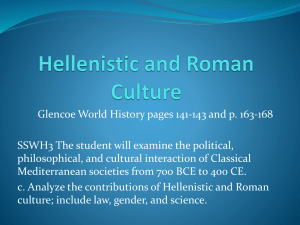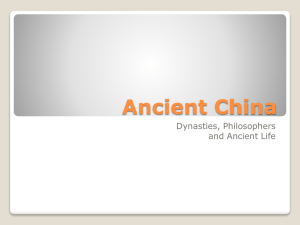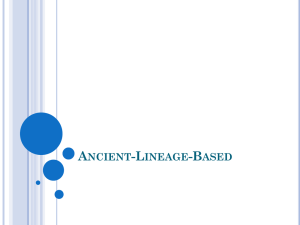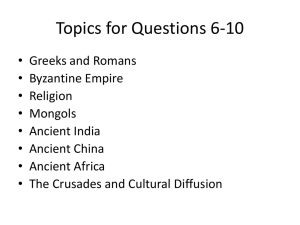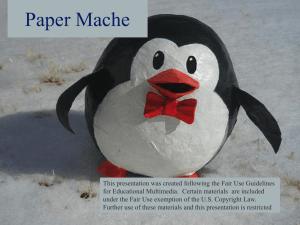Ancient China, Greece, and Mesopotamia
advertisement
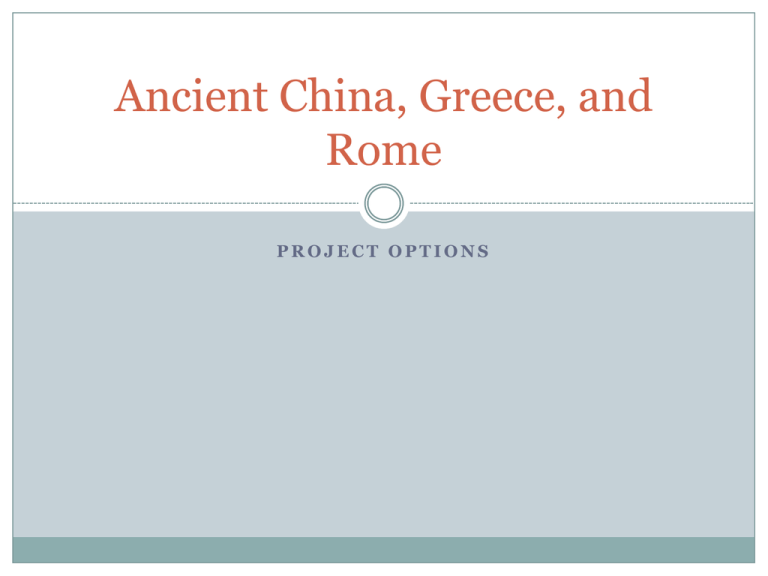
Ancient China, Greece, and Rome PROJECT OPTIONS Project Background You will be creating a project to represent either ancient China, Greece, or Rome. You will be expected to present your project to the class, and the presentation is ¼ of your grade. (If you don’t present, you can’t get higher than a C!) Your project is worth a test grade. Each project will come with a detailed directions sheet for how to complete it. You are responsible to gathering any materials needed to create your project. After all projects have been presented, I will host an ABLE Museum Night where students may come in to see all of the projects and vote on their favorites…anonymously of course! Parents MAY NOT vote. There will be prizes for the top 3 projects! Any student who attends Museum Night will get 10 bonus points on their project! Projects will be due May 22nd and 23rd, and I will choose your due date. China: The World’s Oldest Empire Map Use a piece of poster board to make a map of China which includes major rivers, lakes, mountains, deserts, and seas, and shows historical cities of China. Terra Cotta Statues Imagine that you are working alongside archaeologists at Qin Shi Huang’s tomb. They are excavating artifacts of soldiers, horses, and chariots. Make a clay model of one of them. The Great Wall Create a portion of the Great Wall of China using cardboard, poster board, or boxes. Chinese Dragon Mask Use papier mache and other materials to replicate a dragon mask which could be used in a Chinese New Year celebration. Chinese Lantern Make a replica of a paper lantern using construction paper and other decorations. Ceremonial Kite Make a beautiful kite that includes traditional Chinese motifs in the design. Chinese Fan Using card stock or poster board, make a ceremonial fan decorated with traditional Chinese motifs. Chinese Paper Cuts Design a traditional Chinese paper cut, mount it, and display it. This is a good one if you are short on materials. Chinese Opera Mask Using a balloon and papier mache, design an elaborate Chinese opera mask. Royal Silk Robe Using a white sheet and fabric paints, imagine that you have been commissioned by the emperor to create an elaborate silk robe for an upcoming festival. The sheet does not actually have to be silk! Valley of the Ming Tombs Make a model of the sacred road leading to the Valley of the Ming Tombs. This should include the animals, warriors, and several temples associated with the actual tombs of emperors. Silk Road Diary You are a trader making a trip to China to buy luxury items to be sold in your shop in Constantinople. Keep a journal of your journey explaining routes you took, descriptions of the sights and sounds, examples of transportation and dangers, and other people that you met along the way. Chinese Porcelain Make a papier mache model of a dish with a porcelain pattern painted on it. Chinese Scrolls Using long pieces of construction paper and paint, create a scroll that could be hung in a palace to honor the first day of Spring. Chinese Proverbs Recognize the contributions of Confucius to Chinese culture by choosing one of his saying to feature on a greeting card. This is a good one if you are short on supplies. Chinese Zodiac Create a calendar featuring all of the signs of the Chinese zodiac. Ancient Pagoda Create a 3D picture of an original pagoda with overhanging roofs, elaborate tiles, intricate carvings, and bright colors. Greek Columns Make a replica of one of the types of Greek columns using plaster of Paris and molds. Warning: This project is very involved and will require supplies and effort! Greek Coins Using clay and metallic paint, create a variety of Greek coins. Include a short, descriptive overview of their history and the meaning of the art on them. You can copy ancient Greek coins or design your own. Greek Gods and Goddesses Using aluminum foil and masking tape, create a detailed figurine of your favorite Greek god or goddess. Hoplite Shield Study pictures of hoplons (the shields of the hoplites) and then recreate one of them using cardboard. Archimedes’ Screw Ancient Greek mathematician, Archimedes, invented a device for extracting water from the ground to be transferred to a storage tank or canal. Make a replica of Archimedes’ screw using a plastic soda bottle and other supplies. Ancient Catapult Using a block of wood and other supplies, make a replica of an ancient Greek catapult. Greek Clothing Using a white sheet and fabric paints, make a Greek chiton, or tunic. Brooches Using clay, paint, and safety pins, make some decorative brooches using traditional Greek motifs. Greek Vases Research ancient Greek vases, and choose a shape and design that appeals to you. Make an etching of the vase using construction paper and markers. Amphora Amphoras were beautiful containers filled with olive oil from the sacred trees of Athena. They were often given as prizes after athletic tournaments. Make a replica of an amphora using clay and paints. Olympian Plate Create an Olympian plate that is worthy of the winner of a grueling event using a plate, clay, paints, and other supplies. Note: This picture shows the modern Olympics. Yours should depict the ancient Olympics. Olympic Wreath Make a wreath for an Olympic champion to wear using supplies of your choosing. Greek Fresco Fresco is the art of painting on plastered walls. Using your expertise in ancient Greek art, design a portion of a fresco. Include drawings and symbols which represent the culture of the times. You will need plaster of Paris, a shoebox, paint, and other supplies. Greek Masks Using a balloon, papier mache, and other supplies, make a replica of a theater mask that could have been used in an ancient Greek production. Trojan Horse Using cardboard boxes, paper tubes, dowels, papier mache, clay, and other supplies, make a replica of the Trojan Horse. Note: This project is very involved and will require many supplies. Mosaic Pictures The creation of a mosaic is a labor intensive artistic technique that produces a picture using small pieces of tile, pebbles, or stone. Using a material of your choice, such as paper strips or beans, make a mosaic of a traditional Greek motif. Model of Ancient Athens Using plywood, papier mache, cardboard, clay, plastic figurines, and other supplies, make a model of ancient Athens that includes the Acropolis, the agora, the Theater of Dionysus, the Panathenaic Way, and other important sites. Note: This project is very involved and will require many supplies. Writing Tablet Use a wooden picture frame and paraffin or candle wax to create a writing tablet that an ancient Roman student would have used in the classroom. Roman Tombstone Pretend that you are a tombstone artist and engraver, and design a tombstone that is worthy of a fallen general in the Roman army. You will need clay, carving tools, a rolling pin, and other supplies. Roman Roads Pretend you are a novice road engineer a must complete a construction test to get your Structor Licentia (building license) for building viae publicae (public roads). Build a model of a section of the road using a clear, plastic box, sand, plaster of Paris, and different types of stones. The Groma The groma was a tool used by Roman road builders which used weights attached to strings to make sure the ground was even. Build a groma using poster board, clay, aluminum foil, and other supplies. Milestones Roman milestones were placed at one-mile intervals with the names of the towns to the left and right of the milestone and the distance to each. Make a milestone using a milk carton, paint, and other supplies. Roman Arches Pretend you have been hired to design and build a triumphal arch to a Roman emperor or general. Make a model out of a cereal box, papier mache, paints, and other supplies. Ancient Roman Toga Ancient Roman men often wore togas. Make your own using a white sheet, safety pins, and fabric paint. Ancient Roman Stola Ancient Roman women often wore stolas. Make your own using a sheet, pins, and fabric paint. Laurel Leaf Crown Make a laurel leaf crown like the emperor would have worn using gold paint, artificial leaves, and a gold cord. Ancient Roman Jewelry Make a replica of an ancient Roman brooch using clay, craft pins, a hot glue gun, and paint. Lucky Bulla Roman children wore good luck charms called bullas to keep them safe until they became adults. Make a replica of a bulla using a tin (like one for gum or candy), a string, paint, and other supplies. Roman Shield Study pictures of Roman shields and re-create one using poster board, elastic, paints, and other supplies. Pompeian Lararium Many Pompeian homes had lararia, shrines that honored the protective spirits of their homes. Make a replica of one using boxes, poster board, papier mache, paint, and other supplies. Roman Glass Illustrate an example of what Roman glass looked like using pictures of Roman glass, paper, scissors, and glue. This is a good one if you are short on supplies! A Roman Villa Create your own diorama of a room in a Roman villa using a shoe box, paints, minature plants, toys, etc. Note: This picture is of a diorama of the city, not a villa which is a house. Racing Chariot Make a replica of a Roman chariot using cardboard, paints, and other supplies.




